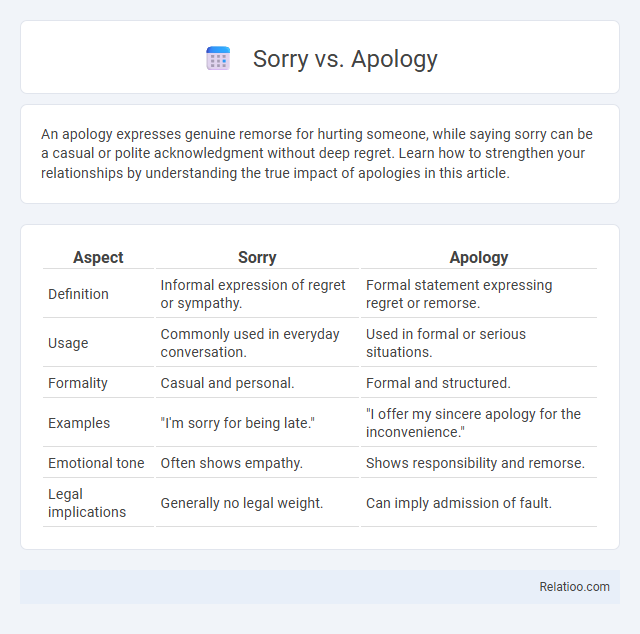An apology expresses genuine remorse for hurting someone, while saying sorry can be a casual or polite acknowledgment without deep regret. Learn how to strengthen your relationships by understanding the true impact of apologies in this article.
Table of Comparison
| Aspect | Sorry | Apology |
|---|---|---|
| Definition | Informal expression of regret or sympathy. | Formal statement expressing regret or remorse. |
| Usage | Commonly used in everyday conversation. | Used in formal or serious situations. |
| Formality | Casual and personal. | Formal and structured. |
| Examples | "I'm sorry for being late." | "I offer my sincere apology for the inconvenience." |
| Emotional tone | Often shows empathy. | Shows responsibility and remorse. |
| Legal implications | Generally no legal weight. | Can imply admission of fault. |
Understanding the Difference: Sorry vs Apology
Sorry" expresses a personal feeling of regret or sympathy, often used casually in everyday situations, while an "apology" is a formal acknowledgment of a mistake or wrongdoing that conveys responsibility and sincerity. Understanding the difference highlights that saying "sorry" may not always imply culpability, whereas an apology explicitly addresses accountability and seeks reconciliation. This distinction is crucial in communication, especially in conflict resolution and legal contexts where clarity in admitting fault impacts outcomes.
Etymology and Origins of “Sorry” and “Apology”
The term "sorry" originates from the Old English word "sarig," meaning distressed or full of sorrow, reflecting a personal feeling of regret or sympathy. "Apology" derives from the Greek "apologia," meaning a speech in defense, initially indicating a reasoned justification rather than an expression of regret. Your understanding of these origins helps clarify that "sorry" conveys emotional remorse while "apology" implies a formal explanation or acknowledgment of culpability.
Cultural Contexts: How Sorry and Apology Differ Globally
Sorry and apology carry different cultural connotations that influence their usage and interpretation worldwide. In Western cultures, saying "sorry" often signifies personal regret or empathy, whereas in many Asian societies, an apology may emphasize social harmony and collective responsibility rather than individual guilt. Your understanding of these distinctions can improve cross-cultural communication and prevent misunderstandings related to culpability and sincerity.
Emotional Impact: The Weight of “Sorry” Versus “Apology”
The emotional impact of "sorry" often carries a personal tone of regret, making it feel more heartfelt and immediate, whereas "apology" tends to be more formal and detached, emphasizing acknowledgement rather than intimacy. Saying "sorry" can foster empathy and connection, softening conflicts by conveying vulnerability and remorse directly. In contrast, the term "culpability" shifts focus to responsibility and blame, which may intensify tension by highlighting fault without necessarily expressing sincere regret.
Formality Matters: When to Use Apology Over Sorry
Apology holds greater formality than sorry, making it suitable for professional or legal contexts where acknowledgment of responsibility is crucial. Sorry is more casual and often used in everyday conversations to express regret without implying full culpability. Your choice between apology and sorry should consider the relationship, setting, and degree of responsibility you wish to communicate.
Sincerity and Authenticity: Which Expresses True Remorse?
Sincerity and authenticity in expressing true remorse are best conveyed through an apology rather than a simple sorry, as an apology acknowledges responsibility and conveys genuine regret. Saying sorry often acts as a social nicety, while an authentic apology involves acknowledging culpability and the impact of one's actions. True remorse requires more than words; it demands accountability and a commitment to change, distinguishing a heartfelt apology from a mere expression of regret.
Sorry in Everyday Conversation: Usage and Perception
Sorry is frequently used in everyday conversation as an informal expression of regret or sympathy, often without implying legal or moral culpability. It functions as a social lubricant to acknowledge minor mistakes, express empathy, or ease interpersonal tension, making it a versatile tool in casual dialogue. Perception of saying "sorry" varies culturally, influencing how it impacts social interactions and relationships.
Apology in Professional and Public Settings
Apology in professional and public settings serves as a strategic communication tool to acknowledge mistakes and rebuild trust with stakeholders while minimizing reputational damage. Unlike a simple sorry, an apology involves taking responsibility and often includes a commitment to corrective action, which is crucial in environments where accountability and transparency are valued. Understanding the nuances of apology versus culpability ensures that organizations address errors effectively without prematurely admitting legal liability.
Addressing Mistakes: Effective Strategies for Saying Sorry or Apologizing
When addressing mistakes, understanding the difference between sorry, apology, and culpability helps clarify your message and responsibility. Saying "sorry" expresses regret personally, while an apology involves a formal statement acknowledging the mistake and its impact on others. You enhance trust and resolve conflicts more effectively by combining sincere expressions with taking clear culpability for your actions.
Improving Relationships: When to Choose Sorry or Apology
Choosing between "sorry" and "apology" depends on the situation: "sorry" expresses immediate regret and empathy, making it suitable for personal interactions to mend feelings quickly; "apology" is a more formal acknowledgment of wrongdoing often necessary in professional or serious contexts. Your ability to discern when to use "sorry" versus a formal "apology" directly impacts the restoration of trust and respect in relationships. Understanding the difference enhances communication by showing genuine remorse while addressing culpability appropriately.

Infographic: Sorry vs Apology
 relatioo.com
relatioo.com